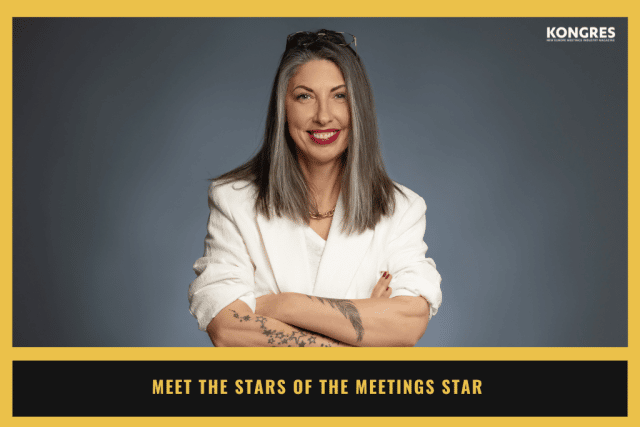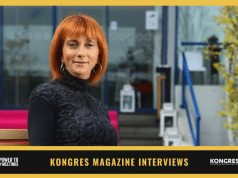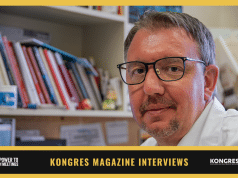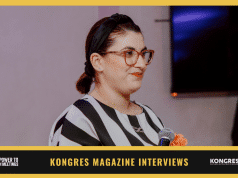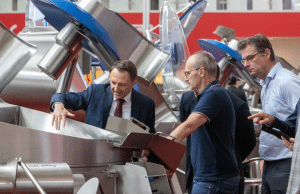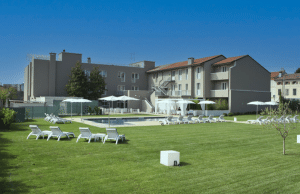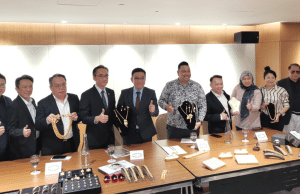Last year’s selection of influencers by Kongres Magazine marked the eighth year of the distinguished project. The selected influencers are trailblazers in their respective fields and help co-create the regional meetings industry. Kongres Magazine’s selection is, in a way, an overview of who is who in the industry.
Q1: Live meetings are coming back. What is your take on the current situation, and what is your prediction for this year?
It’s time they came back. I missed them, and I think we all did. The amount of people attending all kinds of events is incredible. I hope they are here to stay.
Q2: How do you see the future of digital, hybrid and metaverse events?
I am not a fan, but they offered better accessibility for those who could not attend, so I expect them to stay in the hybrid version, at least.

Q3: We are living in uncertain times; in the past two years, we have learned how to cope with a crisis caused by the spread of the coronavirus, and we have found ourselves amid a war recently. How do you face such crisis situations?
We adapt quickly; we are a small yet imaginative and hardworking team, so we take on all these new challenges. But it is tiring, I admit. For example, when the new war started, we were just about to close a deal with one of the commercial fashion brands to be presented at Ljubljana Fashion Week; however, the head office outside Slovenia decided that this is no time for events and shut it down. Sponsors were hesitant, and when I spoke to several clients, they were uncertain how to handle events in order to maintain the seriousness of the situation at the time. A few months later, the war is still here, yet everything’s back to normal (if we disregard the financial crisis and a new Covid wave ahead of us). These things are challenging, annoying and dangerous for our business since politics, markets and public opinion change so quickly.
War is always a shock, and it affects so many people in many ways, but I firmly believe we have the power to help and communicate the right message, yet it’s sometimes very hard to explain it to clients. Events are one of the loudest and most effective messengers, so they should be used as such, and we must fight for that. On the other hand, these situations make me look for other business opportunities that are not so reliant on unstable conditions in the world at the moment. After surviving Covid, the aftermath of it, now this war, and with the new Covid wave coming, I feel I need some certainty in my life.
Q4: What does the future bring for the meetings industry in the next decade? Which challenges should we address immediately?
Besides health issues, I think we will all have to rethink security and financing since the new financial crisis is lurking around the corner, and events are usually the first to be cut off in company budgeting. Sustainability is also one of the issues we will have to take into consideration as quickly and seriously as possible. Basically, when we look around, there is not a lot of good news, hope and positivity in the world around us, so maintaining optimism would be one of them.
Q5: How do you keep up with the changes transforming the business world, particularly in event organising? What is your advice for our readers?
Keep your business in a reasonable size and versatile enough to adapt quickly, keep an open mind, and have a dedicated team that fiercely takes on new challenges.

Q6: Will corporate social responsibility continue to be discussed as a priority at events instead of topical issues, such as climate change or organising events sustainably?
That’s debatable. We all know corporations are the first to take the stand and communicate it; yet, we also know that corporations are where the responsibility is lost so easily among their many employees. Sure, it will be prioritised and talked about, along with climate change and sustainability, those are the hot topics of the moment, but I always have doubts about the execution of it. Let’s wait and see.
When it comes to sustainable events – I don’t think people know enough about what sustainability means – it’s not just recycling, cutting plastic, or using paper or washable straws and cutlery. It’s so much more: transport, all kinds of waste, light and sound pollution etc. We must face the fact that events produce a lot of waste. We can be greener, but truly green events are rare and often costlier, which is something a client doesn’t want to hear. The matter needs a relentless approach and wider knowledge of what sustainability really is – on both sides – the clients’ side and the event industry’s.
Q7: Which trend inspires you the most, and where do you see immense potential for event organisers?
Festivals. They are so many and versatile – they can be original; they can educate, entertain, and benefit the locals as well as the economy, and have a new, young audience who will be the creators of our future. Delivering the message through music and non-traditional media can be so much more effective and fun.
Q8: What perils did new technologies hide during the corona crisis?
The fear of Zoom meetings. Oh, that’s not technology, that’s me 😉.
Q9: What should the meetings industry do to attract talented individuals among its ranks?
Create some kind of certainty, as well as maintain independence and a free-spirited environment to work in.
Q10: Have you noticed that work within the industry is not as desired among the younger generations? What could be the reason behind a significant shortage of staff?
To succeed in this business you must work many late hours, often forget weekends and normal life, solve many uncomfortable situations, do a bunch of desk work and accounting, and be as imaginative as possible on top of it, have nerves and patience to politely talk to clients who don’t understand what it is that you are actually doing whilst keeping a smile on your face. It also requires persistence. Work in the event industry is not as glamorous as it looks, and the pay is not as high as people might think. Younger generations look for quick(er) success and more/easier money for less work, so the event industry is not the first on their list for making it.
Q11: What is your recommendation for young colleagues starting their professional path?
Try a bit of everything to gain experience, listen and learn, think outside the box, expect the worst, but hope for the best, be persistent in following your goal, and remember, you are nothing without a good team – cherish it. It will be hard but it’s worth it.
Find out more about one of Melinda’s projects, Ljubljana Fashion Week, here.


